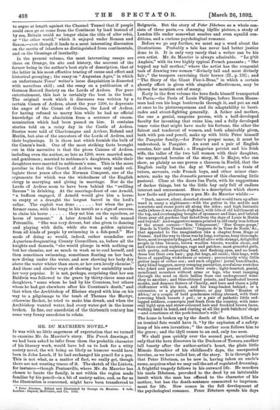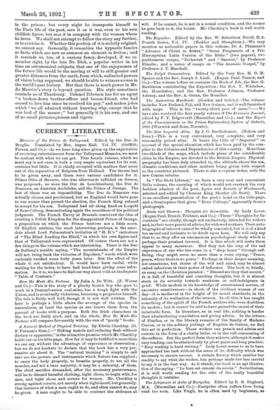MR. DU MAUREER'S NOVEL.*
IT was with no little eagerness of expectation that we turned to examine Mr. du Manner's story. His Punch drawings, if we had been asked to infer from them the probable character of his literary work, would have led us to look for a witty society novel, the wit being as likely as humour would have been in John Leech, if he had exchanged his pencil for a pen. This is not what, as a matter of fact, we really get, though there are not wanting traces of it. The sketch of the Lintots, for instance--though Pentonville, where Mr. du Maurier has chosen to locate the family, is not within the region made familiar by his pencil—is a bit of society satire, and, as far as the illustration is concerned, might have been transferred to • Peter Ibbetson. Edited and Illustrated by George du Manner. 2 vols. London Osgood, IdoIlvaine, and Co. 1392.
Belgravia. But the story of Peter Ibbetson as a whole con- sists of three parts,—a charming idyllic picture, a study of London life under somewhat sombre and even squalid con- ditions, and a curious psychological romance.
Before we go any further, we must say a word about the illustrations. Probably a tale has never had better justice done to it. It is only very rarely that a writer can be his own artist. Mr. du Manner is always admirable. "Le p'tit Anglais," with its two highly typical French peasants ; "She topped my tall mother," where the artist has the congenial task of drawing two women "divinely tall and most divinely fair ;" the troopers exercising their horses (II., p. 132) ; and "The Story of the Giant Fier-5,Bras," in which a certain ghostly effect is given with singular effectiveness, may be chosen for mention out of many.
Early in the first volume the hero finds himself transported to Paris,—the Paris of Louis Philippe, before Baron Hausa- man had run his huge boulevards through it, and put an end at once to its picturesqueness and its adaptability to barri- cades and street-fighting generally. A father and mother, the one a genial, sanguine person, with a half-developed faculty for inventing that ruins him, and a fully developed tenor voice that might have made his fortune, the other the fairest and tenderest of women, and both admirably given, both with pen and pencil, make up with little Peter himself the Pasquier family,—for Peter's proper name, it must be understood, is Pasquier. An aunt and a pair of English cousins, fair and frank; a Hungarian patriot and his Irish wife, the taller of the two tall women with their daughter, the unexpected heroine of the story, M. le Major, who can show, as plainly as one prov,es a theorem in Euclid, that the English really lost the day at Waterloo; and a train of tutors, servants, rude French boys, and other minor char- acters, make up the dramatis personm of this charming little pastoral. Close at the doors lies Paris, with its suggestions of darker things, but to the little boy only full of endless interest and amusement. Here is a description which shows how facile and picturesque a pen Mr. du Manlier wields :—
" Dark, narrow, silent, deserted streets that would turn up after- ward in many a nightmare—with the gutter in the middle and towerlets and stone posts all along the sides; and high fantastic walls (where it was defenda d'afteher), with bits of old battlement at the top, and overhanging boughs of sycamore and lime, and behind them gray old gardens that dated from the days of Louis le Hutin and beyond! And suggestive names printed in old rusty iron letters at the street corners= Rue Videgousset," Rue Coupe-gorge,' Rue de la Vieille Truanderie," Impasse de la Tour de Neale,' &c., that appealed to the imagination like a chapter from Hugo or Dumas. And the way to these was by long, tortuous, busy thorough- fares, most irregularly flagged, and all alive with strange, delightful people in blue blouses, brown woollen tricots, wooden shoes, red and white cotton nightcaps, rags and patches; most graceful girls, with pretty, self-respecting feet, and flashing eyes, and no head- dress but their own hair ; gay, fat hags, all smile ; thin hags, with faces of appalling wickedness or misery; precociously witty little gutter imps of either sex ; and such cripples ! jovial hunchbacks, lusty blind beggars, merry creeping paralytics, scrofulous wretches who joked and punned about their sores ; light-hearted, genial, mendicant monsters without arms or legs, who went ramping through the mud on their bellies from one underground wine- shop to another; and blue-chinned priests, and barefooted brown monks, and demure Sisters of Charity, and here and there a jolly chiffonnier with his hook, and his knap-basket behind ; or a cuirassier, or a gigantic carbineer, or gay little Hunter of Africa,' or a couple of bold gendarmes riding abreast, with their towering black bonnets d poil ; or a pair of pathetic little red- legged soldiers, conscripts just fresh from the country, with inno- cent light eyes and straw-coloured hair and freckled brown faces, walking hand in hand, and staring at all the pork-butchers' shops —and sometimes at the pork-butcher's wife ! "
The home is broken up by the death of the father, killed, as an ironical fate would have it, "by the explosion of a safety- lamp of his own invention ; " the mother soon follows him to
the grave ; and the idyll comes to an end, only too soon.
We shall pass quickly over the second part, mentioning only that the hero discovers in the Duchess of Towers, another tall beauty after the author-artist's heart, the plain little Mimsie Seraskier of his childhood's days, the unexpected heroine, as we have called her, of the story. It is through her that Peter Ibbetson, as he now is, having taken an uncle's name, acquires what we may call the art of regulated dreaming. A frightful tragedy follows in his outward life. He murders his uncle Ibbetson, provoked to the deed by an intolerable insult which the man has offered to the character of his mother, but has the death-sentence commuted to imprison- ment for life. Now comes in the full development of the psychological romance. Peter Ibbetson spends his days in the prison ; but every night he transports himself to the Paris life of the past, sees it as it was, even to his own childish figure, but sees it in company with the woman whom he loves. We shall not attempt to follow the story any further, or to criticise it. Whether this portion of it is strictly original, we cannot say. Generally, it resembles the hypnotic fancies or facts which are now so common an element in fiction ; and it reminds us, too, of a curious fancy, developed, if we re- member right, by the late Dr. Dick, a popular writer in his time on astronomical subjects, that one of the enjoyments of the future life would be the moving at will to still greater and greater distances from the earth, from which, unlimited powers of vision being supposed, we should be able to witness scenes in the world's past history. But that there is much power in Mr. du Manner's story is beyond question. His style sometimes reminds us of Thackeray. Colonel Ibbetson has for an agent "a broken-down brother-officer and bosom-friend, who had ceased to love him since he received his pay," and makes jokes which "we all admired without knowing why, except that he was lord of the manor ;" but generally it is his own, and one of no small picturesqueness and vigour.



































 Previous page
Previous page